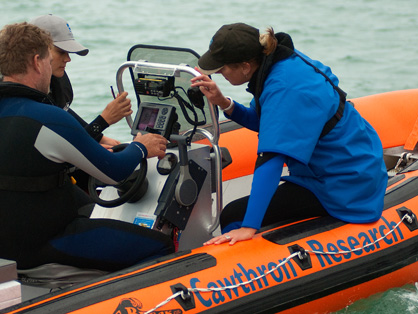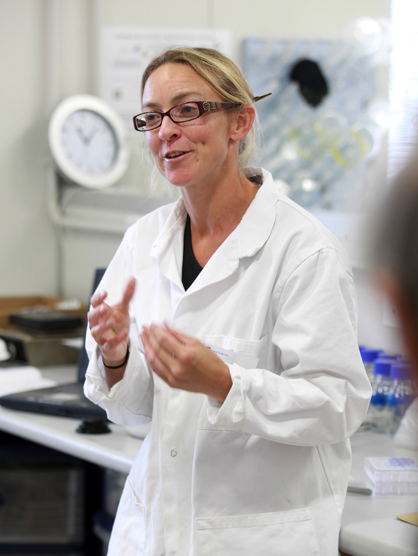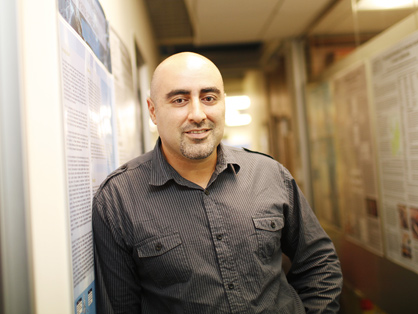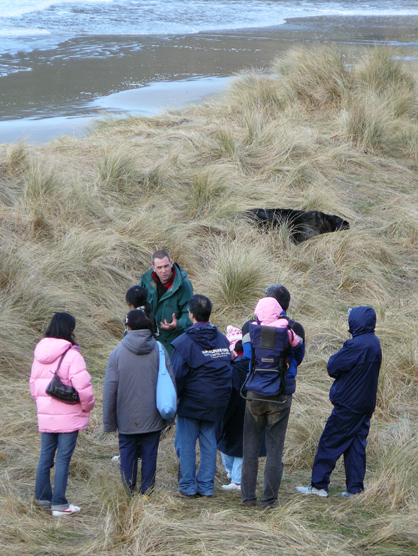Deanna Clement, PhD (2005)

Deanna is a Marine Mammal Ecologist, working for the Cawthron Institute - an independent science organisation that does consulting and research. She studied biology and marine ecology in the United States, and then did her PhD in Zoology and Marine Science at the University of Otago. She works with the marine mammals that live or visit the top of the South Island: fur seals, orca, dolphins, and whales. They are attracted to the area because Cook Strait, the Marlborough Sounds and Tasman Bay are rich in food. However, as the area becomes more developed, there is a need to find out how human activity (aquaculture, boating, logging, sedimentation, etc) may impact on wildlife and its migratory and seasonal patterns. Deanna has designed several resource consent monitoring studies and impact assessments and recently led a three-year study to update the South Island Hector's dolphin population's abundance estimate for the Ministry of Primary Industries.
PhD Topic: Distribution of Hector's Dolphin (Cephalorhynchus hectori) in Relation to Oceanographic Features.
Supervisors: Mark Gibbs (Marine Science), Liz Slooten (Zoology), George Benwell (Business), Peter Whigham (Information Science).
Serean Adams, PhD (2003)

Serean is the Cawthron Institute's Aquaculture Group Manager. She's passionate about New Zealand's aquaculture industry and aims to increase the value of New Zealand's aquaculture sector through research and innovation. Her group's research is varied, from selective breeding and hatchery technology right through to open ocean aquaculture and new aquaculture species. Serean and her group collaborate with universities, including the University of Otago, as well as other research institutes and industry stakeholders.
Much of Serean's own research has focussed on cryopreservation including her PhD. Serean has worked on cryopreservation of gametes and larvae of shellfish and finfish as well as microalgae, kakapo sperm and honey bee sperm. She now serves on the Board of Governors for the Society for Cryobiology – an organisation for scientists involved in low temperature research.
Serean has also worked on improving the reliability of hatchery methods for shellfish larval rearing and triploidy and more recently, on bioactives from shellfish and microalgae.
PhD Topic: Cryopreservation of gametes and larvae of the sea urchin Evechinus chloroticus and of other marine invertebrate species.
Supervisors: Philip Mladenov (Marine Science), Paul Hessian (Physiology).
Armagan Sabetian, MSc (2001)

Armagan decided to do a Masters in coral reef fisheries in the Solomon Islands through the University of Otago. He followed that up with a PhD in the same area at James Cook University in Australia. He is currently the programme leader of Marine Biology at Auckland University of Technology where he maintains his interest in coral reef ecology by teaching a field course paper in the Solomons every year, while in terms of research he is interested in reproductive lipidomics.
MSc topic: Coastal Reef Fisheries and Management Dynamics: A case study from Kolombangara, Solomon Islands.
Supervisors: Richard Walter (Anthropology), Steve Wing (Marine Science).
Shaun McConkey, MSc (1997)

Since 2001 Shaun has worked for Elm Wildlife tours as a wildlife guide taking tourists to see penguins, albatross, fur seals and sea lions. Shaun, with Elm's owner Brian Templeton, established the New Zealand Sea Lion Trust in 2003 and Shaun remained a trustee until 2015. This allowed him to remain actively involved in research of the New Zealand sea lions and he continued with his photographic identification work until 2014. Through Elm, Shaun has been able to share some of his intimate knowledge of the Otago sea lions with others and remain in regular contact with the local sea lion population. Working for Elm has also enabled Shaun to accompany wildlife tours to Borneo.
MSc Topic: Individual Identification, Population Dynamics and Moult of the New Zealand Sea Lion at Otago.
Supervisors: Chris Lalas and Steve Dawson (Marine Science).